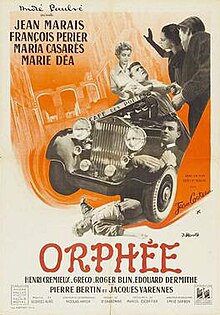Orphée
| Orpheus | |
|---|---|

Theatrical release poster
|
|
| Directed by | Jean Cocteau |
| Produced by | André Paulvé |
| Written by | Jean Cocteau |
| Starring |
Jean Marais François Périer María Casares Marie Déa |
| Music by | Georges Auric |
| Cinematography | Nicolas Hayer |
| Edited by | Jacqueline Sadoul |
| Distributed by | DisCina |
|
Release date
|
|
|
Running time
|
95 minutes |
| Country | France |
| Language | French |
Orpheus (French: Orphée; also the title used in the UK) is a 1950 French film directed by Jean Cocteau and starring Jean Marais. This film is the central part of Cocteau's Orphic Trilogy, which consists of The Blood of a Poet (1930), Orpheus (1950) and Testament of Orpheus (1960).
Set in contemporary Paris, the story of the film is a variation of the classic Greek myth of Orpheus. The picture begins with Orpheus (Marais), a famous poet, visiting the Café des Poètes. At the same time, a Princess (Casares) and Cègeste (Edouard Dermithe), a handsome, young poet that she supports arrive. The drunken Cègeste starts a brawl. When the police arrive and attempt to take Cègeste into custody, he breaks free and flees,only to be run down by two motorcycle riders. The Princess has the police place Cègeste into her car in order to "transport him to the hospital." She also orders Orpheus into the car in order to act as a witness. Once in the car, Orpheus discovers Cègeste is dead and that the Princess is not going to the hospital. Instead, they drive to a chateau (the landscape through the car windows is presented in negative) accompanied by the two motorcycle riders as abstract poetry plays on the radio. This takes the form of seemingly meaningless messages, like those broadcast to the French Resistance from London during the Occupation.
At the ruined chateau, the Princess reanimates Cègeste into a zombie-like state, and she, Cègeste, and the two motorcycle riders (the Princess' henchmen) disappear into a mirror, leaving Orpheus alone. He wakes in a desolate landscape, where he stumbles on the Princess' chauffeur, Heurtebise (Périer), who has been waiting for Orpheus to arrive. Heurtebise drives Orpheus home where Orpheus' pregnant wife, Eurydice (Marie Déa), a police inspector, and Eurydice's friend Aglaonice, (head of the "League of Women," and apparently in love with Eurydice), discuss Orpheus' mysterious disappearance. When Orpheus comes home, he refuses to explain the details of the previous night despite the questions which linger over the fate of Cègeste, whose body cannot be found. Orpheus invites Heurtebise to live in his house and to store the Rolls in Orpheus' garage, should the Princess return. Eurydice attempts to tell Orpheus that she is with child, but is silenced when he rebuffs her.
...
Wikipedia
